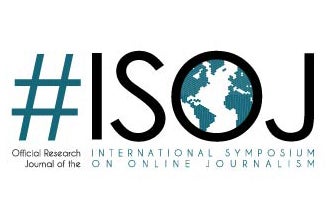"This themed issue of #ISOJ is a response to, as well as a test of, two related premises.
It is a response to the observation that we know far more about what journalists do
differently in a digital age than about how, if at all, they think differently about what they do.
And it is a test of the proposition that while “habits of practice” – what journalists do – have
obviously changed enormously over the past quarter-century, “habits of thought” have
been remarkably resilient (the positive spin) or resistant (the less-positive one) in the face
of this transformation.
Instead, #ISOJ 2018 offers six engaging and informative takes on ways in which
journalists are changing not just their practices but also the mental processes that
they bring to the job. Our authors highlight new patterns of thinking about stories and
audiences, about the use and the purpose of new forms of data, and about journalists’
own activities now and in the future." - Dr. Jane Singer, Guest Editor Read More








